|
|
|
Sort Order |
|
|
|
Items / Page
|
|
|
|
|
|
|
| Srl | Item |
| 1 |
ID:
103247
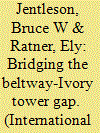

|
|
|
|
|
| Publication |
2011.
|
| Summary/Abstract |
While some gap between the academic and policy worlds is inherent, it is neither necessary nor beneficial for the "Beltway-Ivory Tower" to be as wide as it is. Three principal factors explain the extent of the gap: academia's dominant organizational culture, which devalues policy relevance; increased role of think tanks as research transmission belts to the policy world; and limited interest of the policy community in academic research. The case for the value of greater policy relevance for the international relations scholarly community is based on the intellectual pluralism of bringing policy relevance in while not driving theory out, intellectual complementarity in the different relative strengths of scholars and policy professionals, and self-interest both in what individual scholars can learn and in being true to the mission of universities. We make three principal bridging the gap recommendations: increase disciplinary incentives for policy relevant scholarship, more programmatic and project-based connectivity, and more policy world experiential opportunities.
|
|
|
|
|
|
|
|
|
|
|
|
|
|
|
|
| 2 |
ID:
158857
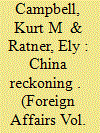

|
|
|
|
|
| Summary/Abstract |
The United States has always had an outsize sense of its ability to determine China’s course [1]. Again and again, its ambitions have come up short. After World War II, George Marshall, the U.S. special envoy to China, hoped to broker a peace between the Nationalists and Communists in the Chinese Civil War. During the Korean War, the Truman administration thought it could dissuade Mao Zedong’s troops from crossing the Yalu River. The Johnson administration believed Beijing would ultimately circumscribe its involvement in Vietnam. In each instance, Chinese realities upset American expectations.
|
|
|
|
|
|
|
|
|
|
|
|
|
|
|
|
| 3 |
ID:
102962
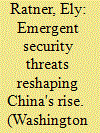

|
|
|
| 4 |
ID:
130472


|
|
|
|
|
| Publication |
2014.
|
| Summary/Abstract |
The United States is in the early stages of a substantial national project: reorienting its foreign policy to commit greater attention and resources to the Asia-Pacific region. This reformulation of U.S. priorities has emerged during a period of much-needed strategic reassessment, after more than a decade of intense engagement with South Asia and the Middle East. It is premised on the idea that the history of the twenty-first century will be written largely in the Asia-Pacific, a region that welcomes U.S. leadership and rewards U.S. engagement with a positive return on political, economic, and military investments.
As a result, the Obama administration is orchestrating a comprehensive set of diplomatic, economic, and security initiatives now known as the "pivot," or "rebalancing," to Asia. The policy builds on more than a century of U.S. involvement in the region, including important steps taken by the Clinton and George W. Bush administrations; as President Barack Obama has rightly noted, the United States is in reality and rhetoric already a "Pacific power." But the rebalancing does represent a significant elevation of Asia's place in U.S. foreign policy.
Questions about the purpose and scope of the new approach emerged as soon as Secretary of State Hillary Clinton offered what remains the clearest articulation of the strategy, and first used the term "pivot" to describe it, in a 2011 article in Foreign Policy. Almost three years later, the Obama administration still confronts the persistent challenge of explaining the concept and delivering on its promise. But despite the intense scrutiny and short-term setbacks faced by the policy, there is little doubt that a major shift is well under way. And whether Washington wants it to or not, Asia will command more attention and resources from the United States, thanks to the region's growing prosperity and influence -- and the enormous challenges the region poses. The question, then, is not whether the United States will focus more on Asia but whether it can do so with the necessary resolve, resources, and wisdom.
|
|
|
|
|
|
|
|
|
|
|
|
|
|
|
|
| 5 |
ID:
075699


|
|
|
| 6 |
ID:
125092


|
|
|
|
|
| Publication |
2013.
|
| Summary/Abstract |
AFTER A year and a half of violence and tens of thousands of deaths in Syria, the UN Security Council convened in July 2012 to consider exerting additional international pressure on President Bashar al-Assad. And for the third time in nine months, Russia and China vetoed any moves toward multilateral intervention. Less than two weeks later, Kofi Annan resigned as the joint UN-Arab League special envoy for Syria, lamenting, "I can't want peace more than the protagonists, more than the Security Council or the international community for that matter."
|
|
|
|
|
|
|
|
|
|
|
|
|
|
|
|
| 7 |
ID:
088416


|
|
|
|
|
| Publication |
2009.
|
| Summary/Abstract |
Why do states realign their foreign policies? I argue that democratic transitions are an important cause of foreign-policy realignment with the United States and, furthermore, that the nature of that realignment is conditioned by whether the United States supported the previous nondemocratic regime. American support, or lack thereof, for the ancien régime structures the domestic politics of democratic transitions. In the absence of previous U.S. support, democratization commonly leads to positive foreign-policy realignment toward the United States. Conversely, when the United States supports nondemocratic regimes, democratic transitions rarely produce positive realignment. I use an original data set of country- year dyads with the United States from 1950 to 2000. Using Markov Transition regression models, I find that the interaction of democratic transition and previous U.S. support is a powerful determinant of foreign-policy realignment. This research has important implications for international relations theory and American foreign policy.
|
|
|
|
|
|
|
|
|
|
|
|
|
|
|
|
| 8 |
ID:
130262


|
|
|
|
|
| Publication |
2013.
|
| Summary/Abstract |
As President Obama enters his second term, continuing to shift U.S. attention and resources to the Asia-Pacific will be a leading U.S. foreign policy priority. While many in the region have welcomed this renewed commitment, the U.S. "pivot" to Asia has created heightened concerns in China about U.S. intentions.1 U.S. efforts to expand its military force posture in Asia, to strengthen security ties with allies and partners, and to enhance the role of regional institutions are viewed by many in Beijing as directly aimed at constraining China's rise and as the principal cause of regional instability as well as the deterioration of China's strategic environment.
|
|
|
|
|
|
|
|
|
|
|
|
|
|
|
|
| 9 |
ID:
127535
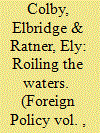

|
|
|
| 10 |
ID:
106389
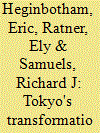

|
|
|
|
|
| Publication |
2011.
|
| Summary/Abstract |
Japan is undergoing profound changes that are empowering its political leadership at the expense of its bureaucracy. But rather than bringing about a clean transfer of institutional authority, the reforms have created gridlock. The U.S.-Japanese alliance isn't dead, but it is getting more complicated.
|
|
|
|
|
|
|
|
|
|
|
|
|
|
|
|
| 11 |
ID:
078042


|
|
|
|
|
|
|
|